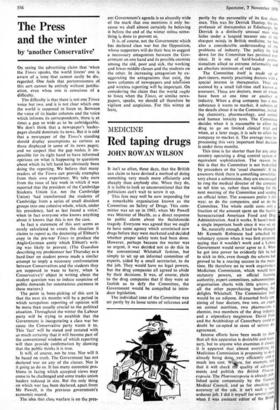The Press and the winter
by 'another Conservative'
On seeing the advertising claim that `when the Times speaks, the world listens' one is aware of a tone that cannot easily be dis- regarded. One feels that portentousness of this sort cannot be entirely without justific- ation, even when one is conscious of a difficulty.
The difficulty is that there is not one Times voice but two, and it is not clear which one the world is supposed to listen to. Between the voice of its leader columns and the voice which informs its correspondents, there is at times a gap so wide as to be unbridgeable. We don't think that a newspaper's leader- pages should dominate its news. But it is odd that a newspaper of the Times's standing should display assumptions as curious as those displayed in some of its news pages; and we suspect that the gap makes it im- possible for its right hand to have informed opinions on what is happening to questions about which its left hand has obviously been doing the reporting. We believe that many readers of the Times can provide examples from their own experience. We take ours from the issue of last week in which it was reported that the president of the Cambridge Students Union (i.e. not the Cambridge Union) `had transformed the students of Cambridge from a series of small dissident groups into one cohesive whole, which, under his presidency, had as last found a voice,' when in fact everyone who knows anything about it knows that this is not the case.
In fact a statement of this sort seems as surely calculated to create the situation it claims to report as the doctoring of Ebbutt's copy in the pre-war Times to produce the Anglo-German amity which Ebbutt's writ- ing was likely to prevent. (The Guardian describing my predecessor last Thursday as a hard-liner on student power made a similar attempt to imply a necessary confrontation between Conservatives and the students they are supposed to want to harry, when 'a Conservative's' object in writing about the student question was to induce suspicion of public demands for ostentatious sternness in these matters.) The point in bone-picking of this sort is that the next six months will be a period in which scrupulous reporting of opinion will be more than usually crucial to the political situation. Throughout the winter the Labour party will be trying to establish that the Government is inaugurating a class war be- cause the Conservative party wants it to. This `fact' will be stated and restated with so much certainty that it will become part of the conventional wisdom of which reporting will then provide confirmation by showing that the public thinks it is true. It will, of course, not be true. Nor will it be based on truth. The Government has not declared war on any of the classes. Nor is it going to do so. It has many economic pro- blems in facing which accepted views may come to be challenged and some trades union leaders reduced in size. But the only thing on which war has been declared, apart from Mr Powell, is the previous government's economic record.
The idea that class warfare is on the pre,'
ent Government's agenda is so absurdly wide of the mark that one mentions it only be- cause we shall almost certainly be believing it before the end of the winter unless some- thing is done to prevent us.
It is, of course, not the Government which has declared class war but the Opposition, whose supporters will do their best to suggest a necesssary antagonism between the Gov- ernment on one hand and its possible enemies among the old, poor and sick, the working and lower-middle classes and the students on the other. In increasing antagonism by ex- aggerating the antagonisms that exist, the news columns of newspapers and television and wireless reporting will be important. On considering the claim that the world ought to listen when the Times, or similar news- papers, speaks, we should all therefore be vigilant and suspicious. For this winter at least,






















































 Previous page
Previous page